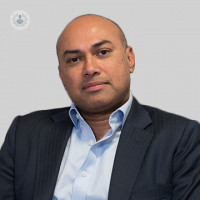Bariatric surgery: gastric bypass and gastric sleeve for obesity
Written by:There are different types of weight loss surgeries that combat obesity in patients. The most commonly performed procedures are a gastric bypass and a gastric sleeve. However, the choice of procedure depends on the consultation between the doctor and patient, which consists of a detailed examination of the personal history of weight gain, eating habits and illnesses such as diabetes.
Expert surgeon Mr Krishna Moorthy provides insight on both of these procedures for those considering weight loss surgery.

What is bariatric (weight loss) surgery?
Bariatric surgical procedures are used to treat people with obesity, and where exercise and diet alone fail. There are a few different surgical procedures, including gastric band, but the most commonly performed are the gastric bypass and the gastric sleeve.
The decision about a weight loss surgery procedure centres on the consultation between the doctor and patient. The primary aim of the consultation is determine the reasons behind the weight gain, tailor the treatment plan to each individual patient, inform and empower the patient to make decisions about surgery and support the patient to make a choice about surgical procedure. Decisions about the procedure can vary depending on eating habits, personal lifestyle and existing medical conditions such as diabetes.
Gastric bypass vs. gastric sleeve
Gastric sleeve:
The principle of this weight loss procedure is to reduce the capacity of the stomach from a big bag to a narrow ‘sleeve’. Patients often ask if they can have a certain percentage of stomach removed. For example, if only 70 per cent can be removed. The success of the procedure does not depend on the proportion of stomach removed but on the size of the stomach that is left behind. The sleeve is calibrated to a sizing tube and the result is that the size of the sleeve is standardised in all patients. This procedure takes 30 to 40 minutes.
Gastric bypass:
This divides the stomach into two parts to create a new, smaller pouch at the end of the oesophagus and leaves the rest of the stomach behind. A loop of small intestine is then attached to the top of the ‘new small stomach’. This procedure is more complex than a sleeve as it involves joining the intestine to the stomach pouch. The procedure can take up to 90 minutes.
What are the benefits of weight loss surgery?
- Reduction in developing life-threatening disease such as diabetes and high blood pressure.
- To treat diseases that already exist: for example surgery can treat diabetes completely in up to 70% of patients.
- Better quality of life.
- Physical functioning: patients can do things that they may not have been able to do before.
- Combat depression.
What are the risks of weight loss surgery?
The risks from weight loss surgery are incredibly low. These include leakage, infection and bleeding but that occurs in less than one percent. After surgery, patients who undergo a gastric bypass will be impacted nutritionally and need to take multivitamins for life. After a gastric sleeve, have an increased risk of developing acid reflux and they may need medicine that reduces this.
What's involved in patient check-ups after weight loss surgery?
Following weight loss surgery, the patient will have a check-up a few weeks later, then in three months, six months and at the end of the year. There is a further check up at end of the second year. Blood tests to check nutritional markers are undertaken at the appointments and patients are then requested to undergo annual check ups with their general practitioners.
What are the success rates of bariatric surgery?
After bypass or sleeve surgery, a patient can lose up to 25-30 per cent of total body weight. A patient can continue to lose up to 50 per cent through exercise and a better lifestyle following surgery.
The stigma surrounding weight loss surgery needs to change as plenty of research reveals there is a hormonal basis to a patient suffering from obesity. Patients who undergo surgery often do not talk to their friends and family about having the procedure and there is a misconception that obesity is just an eating disorder. Society needs to appreciate that some people are prone to obesity and people should understand and appreciate that these patients are making the brave decision to have surgery to prolong their life.
To discover more about making the right weight loss surgery choice for you, arrange a consultation with Mr Moorthy via his Top Doctors profile.


